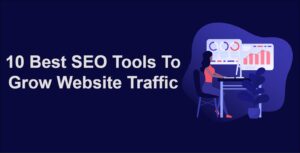search engine optimization (SEO), staying ahead of your competitors is crucial to achieving high rankings and driving organic traffic to your website. To gain a competitive edge, it’s essential to have insights into your competitors’ strategies and performance. This is where SEO competitor analysis tools come into play.
In this comprehensive guide, we’ll explore the best SEO competitor analysis tools that you must check out to enhance your SEO efforts.
In the world of SEO, keeping a watchful eye on your competitors can significantly impact your success. Utilizing SEO competitor analysis tools empowers you with the insights needed to refine your strategies and gain an edge in search rankings.
Integrating these tools into your SEO arsenal can lead to better-informed decisions, higher rankings, and improved organic traffic. Remember, staying ahead in SEO requires continuous monitoring, adaptation, and a willingness to learn from your competitors’ successes and challenges.
What is SEO Competitor Analysis?
SEO competitor analysis is the process of evaluating the strengths and weaknesses of your competitors’ online presence to identify opportunities and potential threats. By analyzing their strategies, keywords, backlink profiles, and content, you can uncover insights that inform your own SEO strategy. This process allows you to make data-driven decisions and refine your approach for better search engine rankings.
The Importance of SEO Competitor Analysis
Understanding your competitors’ SEO strategies provides several benefits:
Identifying Opportunities: Analyzing your competitors’ top-performing keywords and content can help you identify gaps in your strategy that you can capitalize on.
Benchmarking Performance: Comparing your performance against that of your competitors provides a clear picture of where you stand in your industry.
Content Inspiration: Analyzing their content can spark ideas for your own high-quality content creation.
Backlink Building: Studying their backlink profiles can guide your efforts in acquiring high-quality backlinks.
Best SEO Competitor Analysis Tools
1. SEMrush
SEMrush is a versatile SEO tool that offers a robust suite of competitor analysis features. It provides insights into competitors’ organic and paid search strategies, backlink profiles, top-ranking keywords, and more. SEMrush’s competitive research tools allow you to compare your domain against competitors and uncover valuable insights.
Features:
- Competitor Analysis: SEMrush allows you to analyze your competitors’ SEO strategies, including their keywords, backlinks, and ad campaigns.
- Keyword Research: You can discover valuable keywords for your content and ad campaigns, including keyword difficulty and search volume data.
- Site Audit: SEMrush helps you identify and fix your website’s on-page and technical SEO issues.
- Backlink Analysis: Analyze the backlinks pointing to your website and those of your competitors, including anchor text and referring domains.
- Rank Tracking: Track your keyword rankings over time and compare them to your competitors.
- Content Analysis: Discover top-performing content in your niche and identify content gaps.
- PPC Analysis: Get insights into your competitors’ paid advertising campaigns, including ad copies and budget estimates.
- Social Media Tools: Monitor and manage your social media accounts, schedule posts, and track engagement.
- Market Analysis: Gain insights into your industry’s market and audience trends.
Pros:
- Extensive and accurate data: SEMrush provides a wealth of data, including keyword data, backlink information, and competitor insights.
- User-friendly interface: The tool is relatively easy to use, even for beginners.
- Comprehensive competitor analysis: SEMrush offers in-depth competitor research, which is valuable for strategy development.
- Regular updates and improvements: SEMrush constantly updates and adds new features to stay relevant.
- Great for PPC: It’s not just for SEO; SEMrush is excellent for managing and optimizing pay-per-click (PPC) campaigns.
Cons:
- Pricing: SEMrush can be expensive for small businesses and individuals.
- Learning curve: Some features may require time to master fully.
- Limited historical data on lower-tier plans: Historical data may be limited for those on lower-tier plans.
- May be overwhelming: The extensive features can be overwhelming for beginners.
Pricing:
SEMrush offers three main pricing plans, which are billed monthly:
- Pro Plan: $119.95 per month
-
- Ideal for freelancers, startups, and in-house marketers
- Limited to 5 projects, 500 keywords to track, and 100,000 pages to audit
- Guru Plan: $229.95 per month
-
- Suitable for small to mid-sized businesses
- Offers 30 projects, 1,500 keywords to track, and 300,000 pages to audit
- Business Plan: $449.95 per month
-
- Designed for agencies and larger businesses
- Provides 50 projects, 5,000 keywords to track, and 1,000,000 pages to audit
SEMrush also offers a custom “Enterprise” plan for larger organizations with advanced needs.
2. Ahrefs
Ahrefs is renowned for its extensive backlink analysis capabilities. With Ahrefs, you can explore your competitors’ backlink profiles, identify their top linking domains, and discover link-building opportunities. The tool also provides comprehensive keyword analysis and content research features.
Features:
- Site Explorer: Ahrefs provides comprehensive data on a website’s backlinks, organic search traffic, and top-performing content.
- Keyword Research: Discover valuable keywords and assess their search volume, keyword difficulty, and click potential.
- Site Audit: Identify on-page and technical SEO issues, such as broken links, missing meta tags, and duplicate content.
- Content Explorer: Find top-performing content in your niche and analyze content gaps.
- Backlink Analysis: Analyze your backlinks and those of your competitors, including anchor text and referring domains.
- Rank Tracking: Monitor your keyword rankings and track your progress over time.
- Competitor Analysis: Gain insights into your competitors’ keywords, backlinks, and content strategies.
- Site Comparison: Compare multiple websites side by side to identify gaps and opportunities.
- Content Audit: Analyze your content’s performance and find areas for improvement.
Pros:
- Extensive data: Ahrefs provides a vast amount of backlink and keyword data, often considered one of the most accurate in the industry.
- User-friendly interface: It’s known for its user-friendly design and easy navigation.
- Comprehensive competitor analysis: Ahrefs is exceptional for analyzing your competitors’ strategies.
- Regular updates: Ahrefs frequently updates its data and features.
- Useful for backlink analysis: It’s especially strong for backlink research.
Cons:
- Pricing: Ahrefs can be relatively expensive for individuals and small businesses.
- Limited to five users on standard plans: If you need more user accounts, you’ll need to opt for a more expensive plan.
- Learning curve: Some advanced features may require time to learn and master.
- Limited social media and content marketing tools: Ahrefs focuses primarily on SEO.
Here’s the table summarizing Ahrefs’ pricing:
| Plan | Monthly Price | User Accounts | Features |
|---|---|---|---|
| Lite | $99 | 1 | Limited access |
| Standard | $179 | 1 | Full access |
| Advanced | $399 | 3 | Full access |
| Agency | $999 | 5 | Full access |
The choice of plan depends on your specific needs, budget, and the number of user accounts required.
3. Moz
Moz offers a range of SEO tools, including its competitor analysis feature, Moz Pro. It allows you to track competitors’ rankings, analyze their on-page optimization, and monitor their link profiles. Moz’s Link Explorer provides in-depth insights into competitors’ backlinks.
Features:
- Site Audit: Moz helps you identify on-page and technical SEO issues on your website, making recommendations for improvements.
- Keyword Research: Discover and analyze keywords to target in your content and optimization efforts.
- Rank Tracking: Monitor your keyword rankings and track your performance over time.
- Backlink Analysis: Analyze your backlinks and those of your competitors, including domain authority and spam score.
- Competitor Research: Gain insights into your competitors’ SEO strategies, keywords, and backlinks.
- On-Page Grader: Evaluate your on-page SEO and receive recommendations to improve your content’s optimization.
- Link Explorer: Explore and analyze backlinks, referring domains, and anchor text in detail.
- Local SEO: Moz offers local SEO tools to help businesses optimize their presence for local searches.
- Content Suggestions: Get content ideas and keyword suggestions to improve your website’s content.
Pros:
- User-friendly: Moz’s interface is user-friendly, making it accessible for beginners.
- Robust educational resources: Moz offers a wealth of educational content and resources, including guides, webinars, and the Moz Academy.
- Strong focus on local SEO: It provides valuable tools for local businesses.
- Comprehensive SEO recommendations: Moz offers actionable insights to improve on-page and off-page SEO.
- Competitive pricing: Moz is often considered more affordable compared to some other SEO tools.
Cons:
- Limited data: Moz’s link index is not as extensive as some other tools, which may limit backlink analysis.
- Slower updates: Some users report that Moz’s database updates can be slower compared to other tools.
- Fewer features: Moz may not offer as many features as some other comprehensive SEO tools.
- Smaller keyword database: It has a relatively smaller keyword database compared to some competitors.
Here’s the table summarizing Moz Pro’s pricing:
| Plan | Monthly Price | Features |
|---|---|---|
| Standard | $79 | Limited features |
| Medium | $143 | Additional features |
| Large | $199 | Advanced features |
| Premium | Custom | Full suite of features |
Moz also offers a free trial, so you can test their tools before committing to a plan.
4. SpyFu
SpyFu specializes in competitor analysis and offers features to uncover competitors’ most profitable keywords, PPC campaigns, and ad copy. You can gain insights into their organic and paid search strategies to inform your own campaigns.
5. SimilarWeb
SimilarWeb provides insights into competitors’ website traffic, including traffic sources, audience demographics, and user behavior. This information helps you understand their overall online presence and identify potential areas of improvement.
6. CognitiveSEO:
CognitiveSEO offers a comprehensive suite of SEO tools, including competitor analysis features. It provides insights into competitors’ backlink profiles, content performance, and keyword rankings. The tool’s “Unnatural Link Detection” feature helps you identify and disavow harmful backlinks that could impact your SEO.
7. Majestic:
Majestic specializes in backlink analysis and offers a detailed view of competitors’ backlink profiles. The tool provides metrics such as Trust Flow and Citation Flow, allowing you to assess the quality of linking domains. Majestic also offers features for analyzing topical relevance and anchor text distribution.
8. SE Ranking:
SE Ranking offers competitor analysis tools that allow you to track competitors’ rankings, backlinks, and on-page optimization. The tool also provides insights into competitors’ traffic estimates, allowing you to assess their overall online visibility.
9. Screaming Frog SEO Spider:
Screaming Frog is a desktop-based tool that provides a comprehensive website audit, including competitor analysis. You can use it to analyze competitors’ websites for on-page SEO issues, broken links, and metadata optimization.
10. Ubersuggest:
Ubersuggest, created by Neil Patel, offers competitor analysis features that provide insights into competitors’ top-performing content, keywords, and backlinks. The tool’s domain overview feature helps you identify your competitors’ main organic competitors and analyze their performance metrics.
Features:
- Keyword Research: Ubersuggest provides keyword suggestions, search volume, and difficulty scores. It also shows related keywords and content ideas.
- Site Audit: Analyze your website for on-page SEO issues, including duplicate content, missing meta tags, and more.
- Backlink Analysis: Get insights into your backlinks and see your domain score. It also provides competitor backlink data.
- Competitor Analysis: Discover who your competitors are and analyze their SEO performance, including keywords and top pages.
- Content Ideas: Ubersuggest suggests content topics based on your target keywords and competitor analysis.
- Traffic Analysis: See estimated traffic data for any website and get insights into top pages and keywords.
- SEO Audit Reports: Create and download PDF reports to share with your team or clients.
Pros:
- User-friendly: Ubersuggest has an intuitive and straightforward interface, making it accessible to users of all levels.
- Free basic plan: Offers a limited free plan that includes key features, making it budget-friendly for small businesses.
- Keyword suggestions: Provides extensive keyword ideas and data to improve content optimization.
- Quick site audit: The site audit tool helps you identify and fix common on-page SEO issues rapidly.
- Competitor insights: Offers valuable competitor analysis for keyword and content strategy.
Cons:
- Limited data on the free plan: The free plan comes with limitations on data access and report generation.
- Smaller keyword database: Ubersuggest may not have as extensive a keyword database as some other SEO tools.
- Fewer advanced features: It may not have the advanced capabilities of more comprehensive SEO tools.
- Less comprehensive backlink data: Ubersuggest’s backlink analysis may not be as detailed as in other tools.
Ubersuggest offers both free and paid plans. The paid plans are billed monthly and Anually:
Ubersuggest’s pricing:
| Plan | Monthly Price | Features |
|---|---|---|
| Individual | $12 | Additional features |
| Business | $20 | More projects and features |
| Enterprise | Custom | Advanced features and customization |
How to Choose the Right SEO Competitor Analysis Tool
Selecting the right tool depends on your specific needs and goals. Here are some factors to consider:
Features: Evaluate the tools’ features and ensure they align with your requirements. Look for keyword analysis, backlink analysis, and competitive insights.
User-Friendly Interface: Opt for a tool that is easy to navigate and provides clear visualizations of data.
Data Accuracy: Choose a tool known for accurate and up-to-date data. Reliable data is crucial for making informed decisions.
Pricing: Consider your budget and choose a tool that offers the features you need within your price range.
How to Effectively Use SEO Competitor Analysis Tools
1. Identify Key Competitors
Start by identifying your main competitors in your industry. Focus on those with similar target keywords and audience.
2. Analyze Keywords
Use the tools to identify your competitors’ top-ranking keywords. This can help you discover new keyword opportunities and gaps in your strategy.
3. Study Content Strategies
Analyze your competitors’ content to understand what types of content perform well in your industry. This can inspire your own content creation efforts.
4. Explore Backlinks
Examine your competitors’ backlink profiles to find authoritative domains that you can target for link building.
5. Monitor Changes
Regularly track changes in your competitors’ strategies. This allows you to adapt and stay ahead in the competitive landscape.





